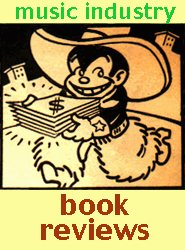
"Hit Men: Power Brokers And Fast Money Inside The Music Business"
by Fredric Dannen
(Vintage Books, 1991)

A wonderfully vindictive book, which starts as a general exploration of big money and disgusting power in the music industry, and gradually develops into a screed against CBS/Sony President Abe Yetnikoff. Dannen describes the transition of the record biz from a makeshift group of independent operators -- song pluggers, talent scouts and guys with an "ear" for a hit -- to a hustling, back-scratching, money laundering payola factory, and finally into small cog in the multinational corporate system. Hit Men is a well-structured, hard-headed explanation of the insidious nature of pop music as big business, and goes into great detail to explain the mechanics and politics behind how the crap we hear on Top 40 radio gets there, and why it hits the charts. Dannen gets all lathered up over Yetnikoff's obscenely lucrative career path. Yetnikoff, a back-scratcher's back scratcher, brokered CBS and Columbia's sale to Sony in the 1980s, triumphally riding on the phenomenal success of (groan) Michael Jackson's Thriller album. He was also a leading player in the move to squelch an investigation into radio payola in the '80s, and moreover, he was a boorish, obnoxious jerk -- overall, an easy and deserving target for public scorn.
Still, Dannen's aesthetic critique of the corporate monster is a bit short-sighted: for example, he leaves unchallenged A&R old-timer Clive Davis' assertion that the dismal chart failure of the second single by Loverboy (a band Davis had signed after an acrimonious break with Yetnikoff and the powers that be) was evidence of the way the good old boy network can freeze out those who don't play ball. Of course, it could have also had something to do with the fact that Loverboy sucked, but that possibility never comes up. Aesthetic omissions like this are minor, however, and this book is definitely recommended to those seeking to understand the way that big ugly multinational corporations control popular culture.
"Stiffed: A True Story Of MCA, The Music Business, And The Mafia"
by William Knoedelseder
(Harper Perennial, 1993)

The sordid story of how MCA Records got "mobbed up" during music biz mogul Irving Azoff's tenure as company president. Knoedelseder starts off with a powerful narrative, but as it shifts from an industry expose into a Mafia fetish, and then into a trial book, it starts to drag. Still, the first third tells you a lot about the underside of the record business economy, in particular, how "cutout" records and counterfeits get into the stores. After that, you'll learn that mafia strongmen and government prosecutors can both be bad for your health and livelihood, lessons which are always good to keep in mind, even though they're almost self-apparent.
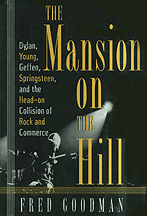
"The Mansion On The Hill: Dylan, Young, Geffen, Springsteen, And The
Head-On Collision Of Rock And Commerce"
by Fred Goodman
(Times Books, 1997)

A good read. Similar in scope to Fredric Dannen's Hit Men, this book charts the growth of rock and roll from a pop culture fad to a multi-billion dollar industry. Goodman argues that the hippie/counterculture entrepreneurs of the 1960s made this growth possible by taking risks on artists, styles and marketing ideas that traditional entertainment companies wouldn't touch with a ten foot woofer. These innovations -- from freeform FM radio to the druggie-oriented concert promotions by Bill Graham and his contemporaries -- succeeded so well that they led to the decimation of the idealistic, freedom worshipping lifestyles they originally cultivated. Goodman contends that when a good thing comes along and someone starts making serious money at it, they'll try and make even more money, and then more and then more -- until the innovation becomes distorted almost beyond recognition. Eventually, it's all just about making money.
After profiling counterculture entrepreneurs such as Dylan's old manager, Albert Goldman, or Bruce Springsteen's career guru, Jon Landau, Goodman sinks his teeth into the life and times of bazillionare media mogul David Geffen. Geffen's little-guy, self-made mythos is trotted out -- how he worked his way up from the mail room at the William Morris Agency, made his first million off Laura Nyro, presided over the L.A. rock-folk scene in the '70s, and profitted from one start-up label sale after another... Although Goldman makes a good case for Geffen as a music industry land shark, he doesn't do as well in justifying his own (seeming) outrage. After all, Geffen doesn't seem that much different from the rest of his L.A. contemporaries, except that he's been way more successful, and he has turned around and spent notably large sums on charity projects (which, sadly, the nouveaux riche seem to have lost the knack for in recent years...) Sure, Geffen screwed artists out of publishing royalties -- but frankly, who wouldn't take Glenn Frey and Don Henley for all they're worth, given the chance??
The narrative runs out of steam, though. Geffen the weasel abruptly emerges as Geffen the Winner -- he's rich, powerful, apparently magnanimous, and untouchable as far as contemporary detractors are concerned. After numerous chapters riling the masses up for a torch-lit march on the Von Geffen castle, the book simply ends. Plunk. Mention is made of Geffen attending expensive charity events with other rich people and using part of his bazillion dollar fortune to fund AIDS research -- the bastard! -- but the case against him stops cold. So much for the personality-driven aspect of the book. Nonetheless, Goodman lays bare the music industry's multi-zillion dollar merger mania, and the rampant consolidation of our media. Recommended reading for the media conscious.
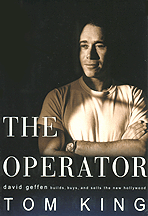
"The Operator: David Geffen Builds, Buys, And Sells The New Hollywood"
by Tom King
(Random House, 2000)

Early on in this biography of entertainment industry mega-mogul David Geffen, the author rehashes the oft-told story of how Geffen lied on his application for a position in the mailroom at the William Morris talent agency -- the job that got him into the business -- and piously describes Geffen as a man "without a moral compass". Unfortunately, King doesn't maintain that level of indignation throughout the book, and though he often goes out of his way to point out the reprehensible nature of this action or that, overall the tone of this book is gossipy and subtly reverential. Unlike Fred Goodman, who almost inexplicably altered the end of his magnificent Mansion On The Hill from an overview of the industry into a scorched-earth attack on David Geffen, King doesn't really seem willing to excoriate his subject, and after a while all the old war stories of band signings and stock options start to seem a bit fawning. Similarly, while describing the back-room negotiations involved in the various mergers, leveraged buyouts and high-finance mega-deals that Geffen has been part of, King fails to really explain the impact that these corporate hijinks have had on our culture. A once wild and challenging array of music labels have been reduced to a handful of corporate holdings, agencies which act in concert with broadcasting and print monopolies to predetermine almost every boring minute of our shared public musical life. Yet rather than reflect on the significance of Geffen's role brokering many of these deals, King's book mostly functions as a tally sheet of the man's wealth. Still, his examination of the minutae of Geffen's life has it's illuminations. I hadn't realized the full extent of Geffen's impact on early '80s pop culture (he bankrolled the movie Risky Business, for example, the teenybopper template for the Reagan-era yuppiness... and he's also to blame for Cats). Also, I hadn't known how notorious Geffen was as a talent agent in the mid-'60s... I thought his star rose mostly after signing Laura Nyro, and was surprised to find out how much of a name he had made before that... Overall, this book is informative, and fairly engaging, but not particularly insightful or passionate.

"Follow The Music: The Life And High Time Of Elektra Records
In The Great Years Of American Pop Culture"
by Jac Holzman & Gavan Daws
(First Media, 1998)

To be sure, the folkie-gone-rock-god uber-indie label, Elektra Records, was one of the great success stories of the 'Sixties cultural explosion. It was started on a shoestring, helped the earnest '60s Folk scene expand in crucial directions, and then -- with a few choice signings -- exploded into an industry giant, persisting as a distinct entity through several decades of industry expansion and consolidation. Still, parts of this book can be a little embarrassing, especially the shamelessly self-congratulatory tone adopted by label founder (and book co-author) Jac Holzman, who apparently has no problem portraying himself as the gifted golden boy that others declared him to be. Then there's also the trouble with the constant lionizing of Jim Morrison and The Doors, who were the biggest feather in Elektra's cap, but who (in my opinion) were also one of the worst and most overrated, overhyped bands to ever slither out of the Sixties. Sure, Morrison was a little sexy (not my type, but hey, whatever...) and a little dangerous ("Look out! a drunk guy is falling off the stage!") but he was in no way shape or form "heavy" or profound, and his music and lyrics were both hamfistedly unsubtle and barely up to par. So, it's a little tough when the co-authors and interviewees in this tome go all gooey over the great Lizard King. Setting that aside, though, Holzman's combination oral history/memoir does provide fascinating insights into how the music industry coalesced around the hippie-era rock boom, and the ways in which luck and chutzpah could help make high finance dreams come true. Particularly interesting are the behind-the-scenes glimpses of the label's pre-rock folk days, when Elektra struggled to promote acts such as Tim Buckley, The Dillards and Judy Henske; how they hit paydirt with Judy Collins and Phil Ochs, and how the interest in folkie singer-songwriter material persisted well into the post-Woodstock pop era. The feel of the book is a little too insider-y, but the details are often illuminating.
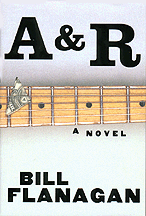
"A&R" By Bill Flanagan
(Random House, 2000)

By now we've all seen High Fidelity... and some of us even read the book! Well, here's the corporate boardroom version of the music geek anti-legend. The book's author is a for-real corporate music exec, VP of the VH-1 video channel, to be exact. The story is a parable about a well-intentioned, bright-eyed boy scout of a music man who gets lured from his comfortable job at a prestigious independent label (roughly modeled on late-'70s Island?), into a corporate position as the number four man at a mega-label (Sony, perhaps?). Disillusionment and moral compromise ensues. Everything starts off just fine, with our hero club-hopping in an effort to sign his favorite band. Flanagan's real-life experience lends the right feel to the subterranean backbiting between rival record label execs, and the routine backslapping and insincere ego-stroking that are the industry's life blood are deftly drawn. The book stumbles, though, fairly early on, as Flanagan forces his characters out of New York and into an overdrawn, Hunter S. Thompson-ish romp in Brazil, which ends in tears and provides a flimsy pretext for one character to pursue a corporate coup. Personally, I would have found it more interesting if he had kept things on a more realistic level, and stuck to the petty personality wars of the entertainment industry to propel events... I'm sure there would be enough unbelievable material right there, and it would have been ultimately more rewarding for the reader. All-in-all, though, the book is fine, and for plebes like me who are eager for a glimpse into the world of corporate culture-making this may be an instructive foray. Speaking through his characters, Flanagan gets off a few understated broadsides at the sad state of post-'60s corporate culture-making, and the way in which record producing has become strictly a joylessly cynical, money-making proposition. So is there a happy ending? Hey - read it and find out!

"The Hits Just Keep On Coming - The History Of Top-40 Radio"
by Ben Fong-Torres
(Miller Freeman Books, 1998)

An odd, interesting homage to the early '60s glory days of the Top-40 format, this book is unfortunately a bit disjointed and hard to follow. Less a history than a series of vignettes and war stories from the veteran disc jockeys of yesteryear, Hits... provides a spark of enthusiasm and a sense of affection for the topic, but it lacks cohesion and clarity. Aside from the introductory sections, Ben Fong-Torres seems almost incapable of providing a clear premise, a topic sentence, or even a central paragraph for most of his chapters. Perhaps he's trying to affect a nonlinear, hip writing style, but the overall effect is pretty muddled. Still, there's some great material here, and if you're familiar with the radio legends of yore -- such as Murray the K, Cousin Brucie, Lee "Baby" Simms, Don Steele...and, of course, Casey Kasem -- this may give you a sense of their careers. There's also an interesting aside about British "pirate radio", the illegal offshore efforts of late-'60s entrepreneurs to open British airwaves up to American-style pop culture commercialization. But it's all a bit jagged and unstructured, and it may require a concerted effort on the part of the reader to pry out a sense of purpose to this loosely-knit tome. The recently updated paperback edition includes a CD's worth of vintage radio shows by several of the DJs profiled in the book: Allan Freed, Gary Owens, Tom Donohue, Murray The K, and others... a very welcome and logical addition to the text!
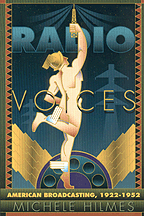
"Radio Voices -- American Broadcasting: 1922-1952"
By Michele Hilmes
(University of Minnesota Press, 1997)

An outstanding, if slightly academic, homage to the glory days of live radio. Hilmes is both a fan of the medium and a critic of its development, paying special attention to radio's role in shaping American national identity. The presentation of women and various ethnic groups is one of her main concerns, but Hilmes isn't a mere PC grind; she also explores the nuances of supposed stereotypes, analyzing the degree to which these characterizations both shaped and reflected the world around them. It's fascinating to read an account of a seemingly "dead" medium... She does a great job capturing the flavor of the times, even though most of us will never be able to hear the shows she mentions. Hilmes draws upon several major media libraries, as well as extensive governmental and academic archives, mixing bureaucratic, sociological and pop cultural perspectives. Of particular interest to readers in the present day, where multinational conglomerates duke it out over the vanishing frontier of post-dotcom economy, and the FCC and Congress have sharply curtailed freedom of expression (under the guise of protecting intellectual property), is the older, earlier story of how the US government and the budding broadcast industry squelched the amatuer broadcasters of the 'teens and '20s. In some ways it's a side note to Himes' wider social concerns, but it couldn't be more timely. Recommended reading!
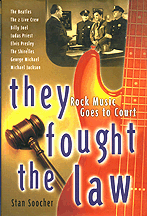
"They Fought The Law: Rock Music Goes To Court"
by Stan Soocher
(Schirmer Books, 1999)

Nothing says "big business" like a good lawsuit or two... and here's a book that's full of them. Whether it's Billy Joel suing his brother-in-law (cum business manager), the Shirelles suing George Harrison, the Beatles suing each other, or some hick parents suing Judas Priest for "causing" their kids to commit suicide (even though they came from physically violent homes), it's all fun and games in the rock and roll courtroom. Most of these are fairly well-known cases, but Soocher's light-handed style lends itself to a quick read. He doesn't get hung up on minutae, and keeps the narrative down to a minimum (although conversely, he also has a genteel streak wherein he sometimes alludes to lurid incidents without fully explaining them, which can get irksome...) Censorship comes up in a few of these cases, but mostly it's all about money, money, money, with a little concern for intellectual property thrown in for good measure. Oddly enough, I found George Michael's lawsuit against Sony to be one of the more interesting chapters in this book -- maybe just because it was one of the least familiar cases. At any rate, if you want to keep your illusions about showbiz intact, you might wanna veer away from this one. If, on the other hand, you're curious about what makes a multi-million dollar contract tick, then snap it up.
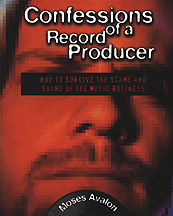
"Confessions Of A Record Producer:
How To Survive The Scams And Shams
Of The Music Business"
by Moses Avalon
(Miller Freeman Books, 1998)

A remarkable -- and eminently useful -- book, written by a music biz minion who's been around long enough to tell tales, but wise enough not to get too flustered by what he's seen. This is a self-help book for fame seekers with a creative streak who don't want to get eaten alive in the music world's most notoriously ego-ridden sharkpools. Avalon explains the bizarre intricacies of recording contracts, the liabilities of taking cash advances from record labels, and how not to get screwed (or simply mislead) by lawyers, music publishers, unions, publicists, and the assorted armies of other professionals who make the recording industry hum. Besides offering quite a bit of practical information, his book is both funny and admirably down to earth -- Avalon uses simple language to de-mystify the basic structure of some of the industry's most complicated arrangements, and has plenty of wry, entertaining asides on the inevitable pain-in-the-ass realities one must face while trying to make it in the business (a whole chapter on "control freaks", for example...) This is the perfect present for anyone you know who's contemplating an artistic career... if you act quickly enough, you might even save someone's life! Highly recommended.

"Secrets Of Negotiating A Record Contract:
The Musician's Guide To Understanding And Avoiding
Sneaky Lawyer Tricks"
by Moses Avalon
(Miller Freeman Books, 2001)

It's hard to imagine Avalon topping Confessions Of A Record Producer, but he does it here, with this equally amazing dissection of the ins-and-outs of that elusive beast, the recording contract. I found this book to be absolutely compelling -- I mean, I thought I had some idea of how record contracts were used to screw artists... You advance them "a lot" of money, then nickle and dime the bands down on various promotional and production expenses , until the only way they can get ahead is to constantly hustle out on the road, playing concerts and selling t-shirts directly to their fans. In a few rare cases, a band becomes a huge success, and they actually make a pile of money on their record sales. But it's so much more insidious than that... so much more complex. Step by step, Avalon examines the potential pitfalls and unavoidable realities of modern recording contracts and contract law. Royaltes, mechanical fees, various kinds of riders and hidden landmines are all brought out in eminently readable, plainspoken English. If you ever even consider putting out a record of your own, then this book, like Avalon's first volume, is a must-read. Very impressive.
"Music Law: How To Run Your Band's Business"
By Rich Stim
(Nolo Press, 1998, 2003)

In a similar vein to Mose Avalon's Confessions Of A Record Producer, copyright attorney Richard Stim's Music Law -- published by the ever-egalitarian, uber-do-it-yourself Nolo Press -- helps musicians keep a level head and navigate the shoals of the music industry. The book is packed with clear-headed analyses of various potential pitfalls, pre-printed sample contracts, examples of marketing and website strategies, and even sample agreements to write up between the bandmembers themselves (in sort of a creative prenuptual contract; it's not only record execs and shady management that can derail your musicmaking...) The book is amply informative, well structured and even-handed; also included is a CD-ROM from which you can print out sample contracts and other forms... Plus, no less than Mose Avalon himself lauds the book as a helpful tool... high praise indeed!


 Other Book Reviews
Other Book Reviews
Indiepop Indiedex
Slipcue Main Index

